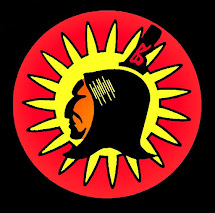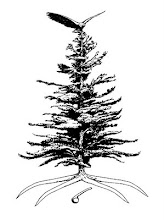 |
| Conference Co-Chair Frank Ettawageshik and Unrecognized John Kane |
It's not a prison
sentence. It just feels like one. And I’m sure it feels the same to many
others. It’s the cost for gaining “recognition” by the U.S. Bureau of Indian
Affairs. And $33 million is what it cost the Shinnecock people. However, as
exorbitant – and unbelievable – as this sounds they are actually the lucky
ones because unlike most that file a petition for federal acknowledgement these
guys actually got something out of it. In my opinion, it wasn't much but at
least it was something.
After what is almost a
lifetime for most Native people, the Shinnecock — who trace their origins back
thousands of years on Long Island, New York — officially got recognized as
"a tribe, band or nation of Indians under federal jurisdiction."
Doesn't sound much like sovereignty when you hear the BIA's definition, does
it? And since this new federal recognition only recognizes them as having
existed since 1934, the Fed's position is that they can't add to their land
base.
This was all explained
quite thoroughly at a conference hosted by Arizona State University's Indian
Law Clinic on January 16 and 17. The conference, which was titled "Who
Decides You're Real? Fixing the Federal Recognition Process," posed one
question, identified a broken system and made some recommendations to fix it.
But to me, it left many questions not only unasked but also clearly unanswered.
I was invited to speak
at this event. In fact, I was on the first panel and was given the enviable
position of being the last panelist to speak during a presentation titled
"Inherent Sovereignty." For me the subject is clear but in the
context of a conference on gaining recognition as a tribe, band or nation of
Indian subordinate to the laws and customs of the United States, the unasked
and unanswered question is — how can these two coexist? Again, for me it is
simple. They can't!
Here are a few of my
comments that brought home some of my main points:
"Inherent sovereignty is a unique
concept. Throughout the world, especially in the dominant European world,
sovereignty was the biggest lie ever told. It was where “God” bestowed ruling
authority upon a certain family — a crown. Biggest lie ever told."
"OUR sovereignty — our right to
life and our freedom — is a product of Creation. When we do an opening [Ohenton
Karihwatehkwen] in my homeland, in the territory of Haudenosaunee, we do a
whole acknowledgement about relationships. We start by acknowledging the
people, everybody who is here. We acknowledge the ground to the stars. We talk
about relationships. The problem with the federal recognition process is it’s
all about ONE relationship between a specific Native people and the Bureau of
Indian Affairs."
"I’m not recognized by the Bureau
of Indian Affairs. I’m not a tribe, band or nation of Indians subordinate to
the laws or customs of the U.S. There is no Mohawk Nation recognized by the
BIA. There is the St. Regis Tribe. And they actually threw the word Mohawk in
there not long ago, so they’re the St. Regis Tribe of Mohawks. But we’ve seen
this happen to all of us. Now, it’s the Oneida Tribe of Wisconsin, the Oneida
Indian Nation of New York, the Seneca Nation of Indians, and the Tonawanda Band
of Senecas. Somewhere along the line somebody drew a border right through
Kanienkehaka territory. Part of this border is the St. Lawrence River but most
of my people live on either side of this imaginary line. So the observation
about the non-federally recognized people asserting more sovereignty than
perhaps the federally recognized ones? I think we qualify for that
because we don’t let that stop us. You will never see us apply. You will
never see the Kanienkehaka submit a petition for federal recognition."
"Now I understand the value of that
[federal recognition]. And let’s face it. The 800-pound gorilla in the room is
gaming — and federal funding. But we need to do more for each other. What’s
missing in the declaration that will be presented later and signed [at this
meeting] is trade and commerce among each other. We need to have THESE kinds of
relationships with one another. THAT is the definition of sovereignty, of
sustainability, and not what federal funding we can get or how many casinos we
can operate. Now I’m not condemning gaming but let’s be clear — gaming is not
possible because of IGRA. And it’s not possible because of Cabazon. It is
possible because of sovereignty. All Cabazon did was to recognize what we
already knew. Of course it paved the way for non-Native people to become our
vendors and opened the door for state governments to get into our businesses.
That’s what IGRA did. But it also opened the floodgates to a whole lot of
people anxious to get a casino. Federal recognition is the pathway for
that."
"We need to start recognizing each
other. When I talk about our Ohenton Karihwatehkwen– that opening we do – we
talk about relationships. But if we’re not talking about these relationships,
and if all we’re talking about is a petition that ends up on the desk of
someone at the BIA, we’d better start thinking about decolonizing our
minds."
After I finished, I received a standing
ovation from the several hundred in the audience. The question-and-answer
session that followed allowed me to make several other points that I simply didn't have time to address in my presentation.
One of those questions is worth
mentioning here. I was asked for my opinion why a Kanienkehaka would not pursue
federal recognition.
Not skipping a beat, this is what I
said:
“Distinction is [at the heart of] the
issue. The problem with the federal recognition process and what is recognized
is that it changes the dynamics of a people, because once it is granted there
seems to be this move toward more assimilation. There seems to be [the mindset
of], “Let’s build something that looks and feels like the state or federal
government,” whether it’s the regulatory systems [or something else]. It’s the
issue of distinction and autonomy. Sovereignty doesn't mean that we DON’T have
a relationship with the federal government. If someone receives federal funds,
and then someone says, “Oh, you’re not sovereign because you receive federal
funds,” then what does that say about, for example, Israel? What does that say
about any other nation that the federal government throw a ton of money at? In
the Mohawk language, the word we use for “treaty” is “we give up our land for
peace.” Well, we didn’t just give it up for peace. There were some obligations made
then. So when I sit here and hear commentary from a Justice Marshall that says
we’re “wards of the state,” or that we’re “domestic dependent nations,” that doesn't mean that we’re not sovereign. We are not wards of the state. It is not
charity that comes into our territory. That’s obligation. That’s debt. We are
creditors. But this federal recognition process and what happens when the
federal government says “now we recognize you as a tribe, band or nation of
Indians subordinate to OUR laws, that’s the biggest obstacle that I have toward
it [federal recognition].”
I left many in Phoenix with plenty to
think about as they traveled home to their territories. The reality is these
issues need to be at the front of our minds here at home every day. Even as the
officials from the U.S. and Canada blow smoke up our backsides about
"tribal sovereignty," it is a lie. Their view of who we are is not our view and they cannot define us or
claim us as their own.
We are Ohnkwe Ohnwe — Real, Original, Human
Beings. Forever.
http://tworowtimes.com/opinions/columns/lets-talk-native/30-years-33-million/







No comments:
Post a Comment